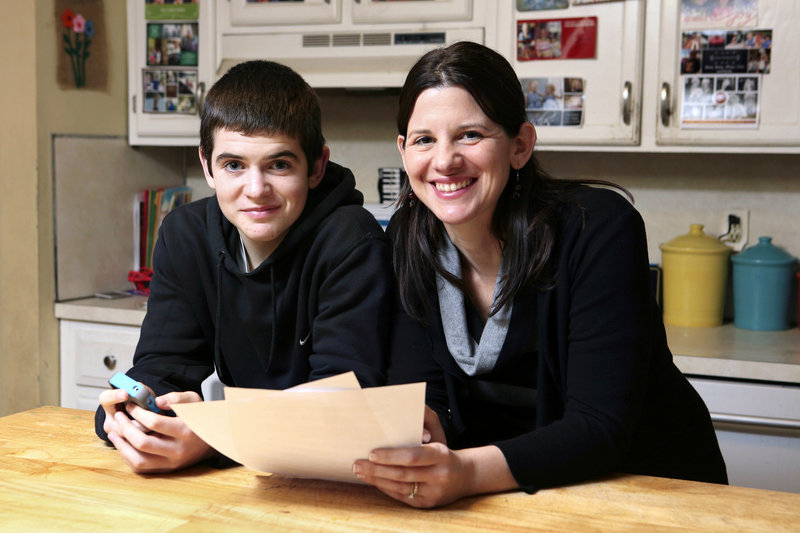NEW YORK — Janell Burley Hofmann honored her 13-year-old son’s “maturity and growth” at Christmas with his first iPhone, but it came with strings attached.
Eighteen strings, to be exact, in a written code of conduct that placed the mommy blogger at the center of the debate over how parents should handle technology in the hands of their teens, especially younger ones just entering the frenetic world of social networks and smartphones.
Thousands of people, including those bemoaning too much helicopter parenting, commented and shared the funny, heartfelt agreement posted by the Sandwich, Mass., mother of five. The interest crashed her website and led her to appear with her eldest, Gregory, on morning TV.
Hofmann’s first order of business: “1. It is my phone. I bought it. I pay for it. I am loaning it to you. Aren’t I the greatest?”
She included caveats that some parenting and tech addiction experts consider crucial in easing new entrants onto Facebook, Instagram and shiny new mobile devices: You must share passwords with a parent, answer their calls, hand over said device early on school nights and a little later on weekends. You must avoid hurtful texts and porn and pay for a replacement if your phone “falls into the toilet, smashes on the ground, or vanishes into thin air.” Of the latter Hofmann advises her teen, “Mow a lawn, stash some birthday money. It will happen; you should be prepared.”
Hofmann said in an interview that she decided on the contract as she pondered the power of the technology she and her husband were about to plop into their son’s world. She was looking for a way to be present in his phone use without being a “creeper,” his word for stalky, spying parents.
She wasn’t surprised that her list, which Greg agreed to, resonates with other parents. It also resonates with psychologist David Greenfield, a technology addiction specialist in West Hartford, Conn.
“We have ritualized the gift of the smartphone,” he said, yet many parents don’t have the know-how, stomach, time or interest in actively guiding kids when they first jump into digital life. For some parents, he said, it’s only when things go horribly wrong that attention is paid.
He knows of parents who have gone so far as to jam all Internet and cell phone signals at home when they couldn’t get their kids to power down. Police in Rocklin, Calif., said two girls, ages 15 and 16, used a prescription sleeping medication recently to spike the milkshakes of one’s parents so they could log onto the Internet after 10 p.m.
Greenfield recommends contracts like Hofmann’s, if parents follow through. Other parents “creep” using apps and monitoring software. He thinks that’s fine, too.
There’s little data broken down by age on the number of Internet users whose lives are negatively impacted by smartphones, tablets, laptops and other technology, Greenfield said. In the general population, studies range from 1 percent to 10 percent of users whose digital habits interfere with their lives. Greenfield estimates the reality is somewhere between 2 and 6 percent.
In a recent report from the Pew Internet & American Life Project, 81 percent of parents with online teens said they are also concerned about how much information advertisers can learn about their kids’ behavior and 72 percent said they’re concerned about how their children interact online with people they don’t know.
Nearly 70 percent said they’re concerned about how their children manage their reputations online and 57 percent of kids ages 12 and 13 said they’re very concerned about it.
Before the conversation with our kids begins, Greenfield said, parents have to deal with their own digital obsessions. “Parents have to have limits, too,” he said. “We have to be brutally honest with ourselves on our own use and abuse.”
Send questions/comments to the editors.



Success. Please wait for the page to reload. If the page does not reload within 5 seconds, please refresh the page.
Enter your email and password to access comments.
Hi, to comment on stories you must . This profile is in addition to your subscription and website login.
Already have a commenting profile? .
Invalid username/password.
Please check your email to confirm and complete your registration.
Only subscribers are eligible to post comments. Please subscribe or login first for digital access. Here’s why.
Use the form below to reset your password. When you've submitted your account email, we will send an email with a reset code.